Five reasons to still use a typewriter
- Published
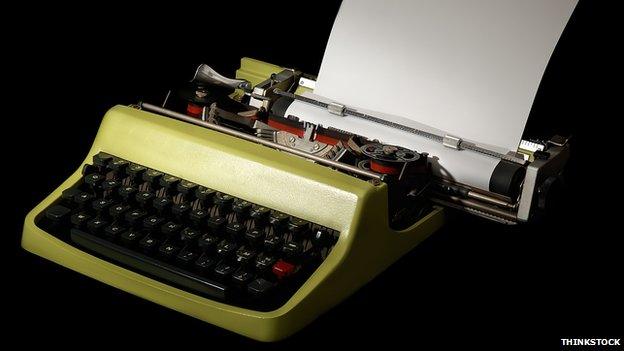
The end of an era has been marked, with the last typewriter built in the UK rolling off the production line at Brother's north Wales factory.
The firm donated the last machine to London's Science Museum - but, it seems, there are plenty of writers and fans who think a museum is the last place their beloved, indispensable tool should be.
So, who still uses typewriters? And why do they choose to use them?
Refuseniks
They might be in a minority, but fans of the typewriter remain a vociferous group.
Mike France, who sells typewriter ribbons, says conversations with elderly customers mostly revolve around their dislike for computers and their fear of losing their old typewriting machines. "We get letters and cards from people thanking us and saying 'You saved my life, it's my lifeline'," he says.
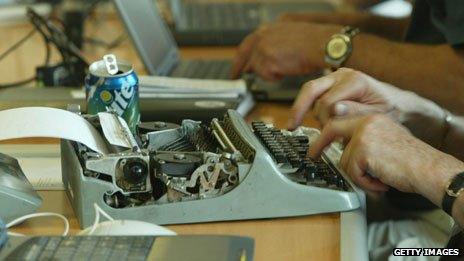
But journalist and collector Richard Milton, who runs the Portable Typewriter website, external, a virtual museum of typewriters, says it is more of an idealist's tool.
"There's something special about typewriters - they're connected to language and connected to people's lives in a rather romantic way," he says. "Every writer rather fancies having an Agatha Christie-style sit-up-and beg typewriter on their desk that they can write their wonderful novel on."
But collector Anthony Casillo says typewriters are simply practical.
"People still use typewriters because they still work. They offer a distraction-free alternative to the modern day methods for producing a document. They challenge the user to be more efficient and see their errors on paper."
Writers and journalists have also spoken of their love for the ageing machine.
"I've gone back to using a typewriter for the first draft. It forces you to think," said author Will Self in a recent magazine interview., external "Instead of going, 'She wore a red dress. Wait, that's banal I'll make it purple or green...' you think, 'Right, what colour was her dress.' It brings order back into your mind."
Former court reporter Maureen Huggins managed to use typewriters for her entire 55 years as a court reporter, saying computers would "kill journalism".
To be cool
Casillo, who has been in the typewriter industry for almost 40 years and collected vintage typewriters for the past 30, says while "older folks" resist technology, the youngest missed the original typewriter experience, hence the interest now.
Tom Furrier, who owns a typewriter repair shop in Arlington, Massachusetts, says: "Young people or the under-30 crowd [as] I call them, have grown up with this new technology and never experienced analogue toys and games. They are fascinated by the sensory feedback they get. The feel, the sound, seeing the printed image, immediately amazes them.
"Some younger people are tired of the soullessness of computers and digital technology and looking for a better experience. Creative type younger kids get the typewriter vibe and the old school ways of doing things. The number one reason younger people tell me they like typewriters is that they can type with no distractions. No internet or email or googling to distract them. They're just typing, creating."
Times columnist and author Caitlin Moran appears with a typewriter on the cover of her book Moranthology, seemingly jumping on the retro bandwagon.
But, she explains in a tweet, external, "someone just brought it to the shoot. I HATE typewriters. I love my laptop." But her husband, music journalist Pete Paphides, loves typewriters as he hates printers.
No electricity
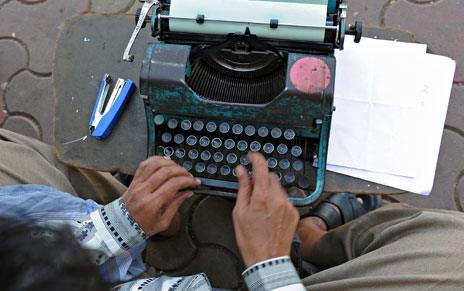
Typing an affidavit outside court in Mumbai
Typewriters may have been largely consigned to history in many countries but in those where electricity supply is erratic, they can be vital.
In Mumbai, India's most populous city, the unmistakable "clack, clack, clack" of typewriters sounds out as professional typists sit in the street outside court houses writing up legal documents.
Aesthetic reasons
To Keira Rathbone, the typewriter is a source of art. The London-based artist unlocks a rather different side of the contraption by creating visual art out of characters.
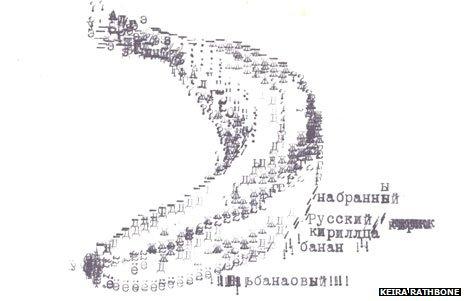
Explaining why she loves the form of art, she says: "I think it's the mechanics of it and being able to feel the mechanisms. It's not like using a computer where it's all a bit of a mystery and covered up. You can see if there's nothing wrong with it straight away... It's just fascinating to be able to look at what you're typing."
From afar, she says her art resembles a pen and ink drawing.
"I find children's reactions particularly interesting as most small children do not even know what the machine is, and are beautifully uninhibited with their intrigue. I feel privileged to get to introduce them to the typewriter for the first time."
Typewriters are also very much in demand for period dramas or for plays. Meanwhile, Milton was recently contacted by a production company working on a war-time detective drama. They wanted typewriter lessons for a female secretary actress so she could "appear natural at the desk," he says.
Prices are rocketing as they become more sought after among collectors, he says. "They are antiques nowadays. Nobody is making them anywhere in the world - I don't know of a single factory still making them anywhere."
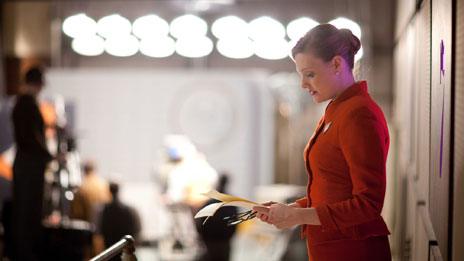
In demand with set designers working on period dramas
They are also popular among those who want a fashionable piece of equipment for their lounge or office, for an "aesthetically-pleasing environment".
"People in antiques or collectors are always looking for new things to collect - there's only so many Georgian paperweights you can have," he says.
Lastly, from a nice office centrepiece to an altogether different centrepiece for...
Weddings
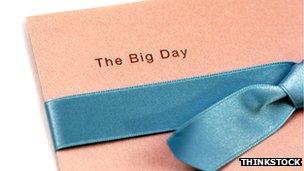
Typed for retro chic
Engaged couples are looking to years gone by for inspiration for their big days - and that includes retro or antique typewriters.
Milton says many couples now opt to create their invitations on typewriters and they then have them at their do so guests can write a few words of congratulations.
"It's rather chic I suppose. Everything is retro now - the 1960s, 70s and 80s are all in," he explains.
You can follow the Magazine on Twitter, external and on Facebook, external
- Published20 November 2012
- Published12 November 2012